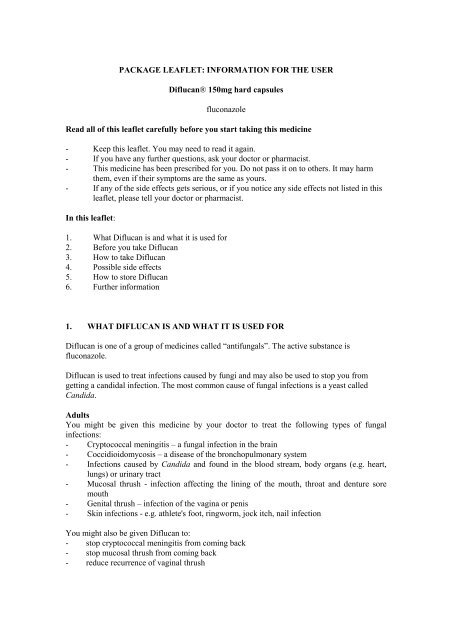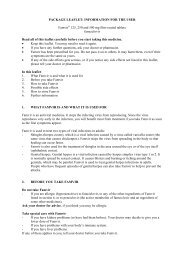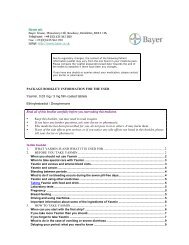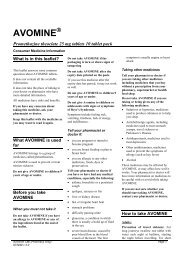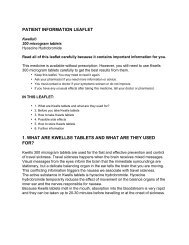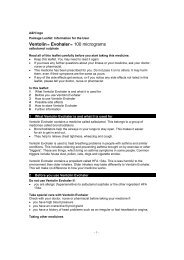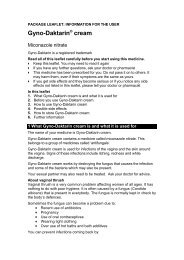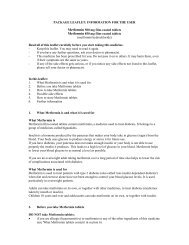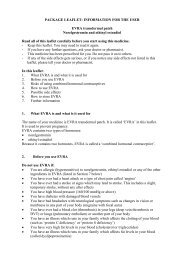Patient Leaflet Download here - HealthExpress
Patient Leaflet Download here - HealthExpress
Patient Leaflet Download here - HealthExpress
You also want an ePaper? Increase the reach of your titles
YUMPU automatically turns print PDFs into web optimized ePapers that Google loves.
PACKAGE LEAFLET: INFORMATION FOR THE USERDiflucan® 150mg hard capsulesfluconazoleRead all of this leaflet carefully before you start taking this medicine- Keep this leaflet. You may need to read it again.- If you have any further questions, ask your doctor or pharmacist.- This medicine has been prescribed for you. Do not pass it on to others. It may harmthem, even if their symptoms are the same as yours.- If any of the side effects gets serious, or if you notice any side effects not listed in thisleaflet, please tell your doctor or pharmacist.In this leaflet:1. What Diflucan is and what it is used for2. Before you take Diflucan3. How to take Diflucan4. Possible side effects5. How to store Diflucan6. Further information1. WHAT DIFLUCAN IS AND WHAT IT IS USED FORDiflucan is one of a group of medicines called “antifungals”. The active substance isfluconazole.Diflucan is used to treat infections caused by fungi and may also be used to stop you fromgetting a candidal infection. The most common cause of fungal infections is a yeast calledCandida.AdultsYou might be given this medicine by your doctor to treat the following types of fungalinfections:- Cryptococcal meningitis – a fungal infection in the brain- Coccidioidomycosis – a disease of the bronchopulmonary system- Infections caused by Candida and found in the blood stream, body organs (e.g. heart,lungs) or urinary tract- Mucosal thrush - infection affecting the lining of the mouth, throat and denture soremouth- Genital thrush – infection of the vagina or penis- Skin infections - e.g. athlete's foot, ringworm, jock itch, nail infectionYou might also be given Diflucan to:- stop cryptococcal meningitis from coming back- stop mucosal thrush from coming back- reduce recurrence of vaginal thrush
- amitriptyline, nortriptyline (used as anti-depressant)- amphotericin B, voriconazole (anti-fungal)- medicines that thin the blood to prevent blood clots (warfarin or similar medicines)- benzodiazepines (midazolam, triazolam or similar medicines) used to help you sleep orfor anxiety- carbamazepine, phenytoin (used for treating fits)- nifedipine, isradipine, amlodipine, felodipine and losartan (for hypertension- high bloodpressure)- ciclosporin, everolimus , sirolimus or tacrolimus (to prevent transplant rejection)- cyclosphosphamide, vinca alkaloids (vincristine, vinblastine or similar medicines) usedfor treating cancer- halofantrine (used for treating malaria)- statins (atorvastatin, simvastatin and fluvastatin or similar medicines) used for reducinghigh cholesterol levels- methadone (used for pain)- celecoxib, flurbiprofen, naproxen, ibuprofen, lornoxicam, meloxicam, diclofenac (Non-Steroidal Anti-Inflammatory Drugs (NSAID))- oral contraceptives- prednisolone (steroid)- zidovudine, also known as AZT; saquinavir (used in HIV-infected patients)- medicines for diabetes such as chlorpropamide, glibenclamide, glipizide or tolbutamide- theophylline (used to control asthma)- vitamin A (nutritional supplement)Please tell your doctor or pharmacist if you are taking or have recently taken any othermedicines, including medicines obtained without a prescription.Taking Diflucan with food and drinkYou can take your medicine with or without a meal Pregnancy and breast-feedingTell your doctor if you are pregnant, trying to become pregnant or breast-feeding. You shouldnot take Diflucan while you are pregnant or breast-feeding unless your doctor has told you to.Ask your doctor or pharmacist for advice before taking any medicines.Driving and using machinesWhen driving vehicles or using machines, it should be taken into account that occasionallydizziness or fits may occur.Important information about some of the ingredients of DiflucanThis medicine contains a small amount of lactose (milk sugar), if you have been told by yourdoctor that you have an intolerance to some sugars, please contact your doctor before takingthis medicine.3. HOW TO TAKE DIFLUCANAlways take your medicine exactly as your doctor has told you. You should check withyour doctor or pharmacist if you are not sure.Swallow the capsule whole with a glass of water. It is best to take your capsules at the sametime each day.The usual doses of this medicine for different infections are below:
AdultsConditionTo treat cryptococcal meningitisTo stop cryptococcal meningitis from coming backTo treat coccidioidomycosisTo treat internal fungal infections caused by CandidaTo treat mucosal infections affecting the lining ofmouth, throat and denture sore mouthTo treat mucosal thrush – dose depends on w<strong>here</strong> theinfection is locatedDose400 mg on the first day then 200 mg to400 mg once daily for 6 to 8 weeks orlonger if needed. Sometimes doses areincreased up to 800 mg200 mg once daily until you are told tostop200 mg to 400 mg once daily from11 months for up to 24 months or longerif needed. Sometimes doses are increasedup to 800 mg800 mg on the first day then 400 mg oncedaily until you are told to stop200 mg to 400 mg on the first day then100 mg to 200 mg until you are told tostop50 mg to 400 mg once daily for 7 to30 days until you are told to stopTo stop mucosal infections affecting the lining ofmouth, throatTo treat genital thrushTo reduce recurrence of vaginal thrushTo treat fungal skin and nail infectionsTo stop you from getting an infection caused byCandida (if your immune system is weak and notworking properly)100 mg to 200 mg once daily, or 200 mg3 times a week, while you are at risk ofgetting an infection150 mg as a single dose150 mg every third day for a total of3 doses (day 1, 4 and 7) and then once aweek for 6 months while you are at riskof getting an infectionDepending on the site of the infection50 mg once daily, 150 mg once weekly,300 to 400 mg once weekly for 1 to4 weeks (Athlete’s foot may be up to6 weeks, for nail infection treatment untilinfected nail is replaced)200 mg to 400 mg once daily while youare at risk of getting an infectionAdolescents from 12 to 17 years oldFollow the dose prescribed by your doctor (either adults or children posology).Children to 11 years oldThe maximum dose for children is 400 mg daily.The dose will be based on the child’s weight in kilograms.
ConditionMucosal thrush and throat infections caused byCandida – dose and duration depends on the severityof the infection and on w<strong>here</strong> the infection is locatedCryptococcal meningitis or internal fungal infectionscaused by CandidaTo stop children from getting an infection caused byCandida (if their immune system is not workingproperly)Daily dose3 mg per kg of body weight (6 mg per kgof body weight might be given on thefirst day)6 mg to 12 mg per kg of body weight3 mg to 12 mg per kg of body weightUse in children 0 to 4 weeks of ageUse in children of 3 to 4 weeks of age:The same dose as above but given once every 2 days. The maximum dose is 12 mg per kg ofbody weight every 48 hours.Use in children less than 2 weeks old:The same dose as above but given once every 3 days. The maximum dose is 12 mg per kg ofbody weight every 72 hours.Doctors sometimes prescribe different doses to these. Always take your medicine exactly asyour doctor has told you. You should check with your doctor or pharmacist if you are not sure.ElderlyThe usual adult dose should be given unless you have kidney problems.<strong>Patient</strong>s with kidney problemsYour doctor may change your dose, depending on your kidney function.If you take more Diflucan than you shouldTaking too many capsules at once may make you unwell. Contact your doctor or your nearesthospital casualty department at once. The symptoms of a possible overdose may include hearing,seeing, feeling and thinking things that are not real (hallucination and paranoid behaviour).Symptomatic treatment (with supportive measures and gastric lavage if necessary) may beadequate.If you forget to take DiflucanDo not take a double dose to make up for a forgotten dose. If you forget to take a dose, take itas soon as you remember. If it is almost time for your next dose, do not take the dose that youmissed.If you have any further questions on the use of this medicine, ask your doctor or pharmacist.4. PSSIBLE SIDE EFFECTSLike all medicines, Diflucan can cause side effects, although not everybody gets themA few people develop allergic reactions although serious allergic reactions are rare. If you getany of the following symptoms, tell your doctor immediately.
- sudden wheezing, difficulty in breathing or tightness in the chest- swelling of eyelids, face or lips- itching all over the body, reddening of the skin or itchy red spots- skin rash- severe skin reactions such as a rash that causes blistering (this can affect the mouth andtongue).Diflucan may affect your liver. The signs of liver problems include:- tiredness- loss of appetite- vomiting- yellowing of your skin or the whites of your eyes (jaundice)If any of these happen, stop taking Diflucan and tell your doctor immediately.Other side effects:Additionally, if any of the following side effects gets serious, or if you notice any side effects notlisted in this leaflet, please tell your doctor or pharmacist.Common side effects which affect 1 to 10 users in 100 are listed below:- headache- stomach discomfort, diarrhoea, feeling sick, vomiting- increases in blood tests of liver function- rashUncommon side effects which affect 1 to 10 users in 1,000 are listed below:- reduction in red blood cells which can make skin pale and cause weakness orbreathlessness- decreased appetite- inability to sleep, feeling drowsy- fit, dizziness, sensation of spinning, tingling, pricking or numbness, changes in sense oftaste- constipation, difficult digestion, wind, dry mouth- muscle pain- liver damage and yellowing of the skin and eyes (jaundice)- wheals, blistering (hives), itching, increased sweating- tiredness, general feeling of being unwell, feverRare side effects which affect 1 to 10 users in 10,000 are listed below:- lower than normal white blood cells that help defend against infections and blood cellsthat help to stop bleeding- red or purple discoloration of the skin which may be caused by low platelet count, otherblood cell changes- blood chemistry changes (high blood levels of cholesterol, fats)- low blood potassium- shaking- abnormal electrocardiogram (ECG), change in heart rate or rhythm- liver failure- allergic reactions (sometimes severe), including widespread blistering rash and skinpeeling, severe skin reactions, swelling of the lips or face
- hair lossIf any of the side effects gets serious, or if you notice any side effects not listed in this leaflet,please tell your doctor or pharmacist.5. HOW TO STORE DIFLUCAN- Keep out of the reach and sight of children.- Do not use Diflucan after the expiry date which is stated on the pack after EXP. Theexpiry date refers to the last day of the month.- Store below 30°CMedicines should not be disposed of via wastewater or household waste. Ask your pharmacisthow to dispose of medicines no longer required. These measures will help to protect theenvironment.6. FURTHER INFORMATIONWhat Diflucan contains- The active substance is fluconazole.- Each hard capsule contains 150 mg of fluconazole.- The other ingredients are:Capsule content: lactose monohydrate, maize starch, colloidal silica anhydrous, magnesiumstearate and sodium laurilsulfate.Capsule shell composition:150 mg hard capsules: gelatin, titanium dioxide (E171) and patent blue V (E131)Printing ink: shellac (glaze), black iron oxide, N-Butyl alcohol, dehydrated alcohol, purifiedwater, propylene glycol, industrial methylated spirit, isopropyl alcohol, strong ammoniasolution, potassium hydroxideWhat Diflucan 150 mg hard capsules look like and contents of the pack- Diflucan 150 mg hard capsules have a turquoise blue body and a turquoise blue cap.They have “FLU-150” and “Pfizer” with black ink printed on them.Diflucan 150 mg come in packs of 1, 2, 3, 4, 6, 7, 10, 12, 14, 20, 28, 30, 42, 50, 60, 100 or500 hard capsules.Not all pack sizes may be marketed.Marketing Authorisation HolderPfizer LimitedRamsgate RoadSandwichKentCT13 9NJUnited Kingdom
ManufacturerPfizer PGM,Zone Industrielle,29 route des Industries,37530 Poce sur Cisse,FranceThis leaflet was last approved in: 11/ 2011DF 1_0 UK/IE


